
Biological therapy for inflammatory bowel disease
Encyclopedia
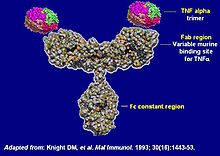
Molecule
A molecule is an electrically neutral group of at least two atoms held together by covalent chemical bonds. Molecules are distinguished from ions by their electrical charge...
s that are involved in the disease process have been identified, and can be targeted for biological therapy; many of these molecules, which are mainly cytokine
Cytokine
Cytokines are small cell-signaling protein molecules that are secreted by the glial cells of the nervous system and by numerous cells of the immune system and are a category of signaling molecules used extensively in intercellular communication...
s, are directly involved in the immune system
Immune system
An immune system is a system of biological structures and processes within an organism that protects against disease by identifying and killing pathogens and tumor cells. It detects a wide variety of agents, from viruses to parasitic worms, and needs to distinguish them from the organism's own...
. Biological therapy
Immunotherapy
Immunotherapy is a medical term defined as the "treatment of disease by inducing, enhancing, or suppressing an immune response". Immunotherapies designed to elicit or amplify an immune response are classified as activation immunotherapies. While immunotherapies that reduce or suppress are...
has found a niche in the management of cancer
Cancer
Cancer , known medically as a malignant neoplasm, is a large group of different diseases, all involving unregulated cell growth. In cancer, cells divide and grow uncontrollably, forming malignant tumors, and invade nearby parts of the body. The cancer may also spread to more distant parts of the...
, autoimmune disease
Autoimmune disease
Autoimmune diseases arise from an overactive immune response of the body against substances and tissues normally present in the body. In other words, the body actually attacks its own cells. The immune system mistakes some part of the body as a pathogen and attacks it. This may be restricted to...
s, and diseases of unknown cause that result in symptoms due to immune related mechanisms.
Inflammatory bowel disease, or IBD
Inflammatory bowel disease
In medicine, inflammatory bowel disease is a group of inflammatory conditions of the colon and small intestine. The major types of IBD are Crohn's disease and ulcerative colitis.-Classification:...
, is a collection of systemic disease
Disease
A disease is an abnormal condition affecting the body of an organism. It is often construed to be a medical condition associated with specific symptoms and signs. It may be caused by external factors, such as infectious disease, or it may be caused by internal dysfunctions, such as autoimmune...
s involving inflammation
Inflammation
Inflammation is part of the complex biological response of vascular tissues to harmful stimuli, such as pathogens, damaged cells, or irritants. Inflammation is a protective attempt by the organism to remove the injurious stimuli and to initiate the healing process...
of the gastrointestinal tract
Gastrointestinal tract
The human gastrointestinal tract refers to the stomach and intestine, and sometimes to all the structures from the mouth to the anus. ....
. IBD includes two (or three) diseases of unknown causation: ulcerative colitis
Ulcerative colitis
Ulcerative colitis is a form of inflammatory bowel disease . Ulcerative colitis is a form of colitis, a disease of the colon , that includes characteristic ulcers, or open sores. The main symptom of active disease is usually constant diarrhea mixed with blood, of gradual onset...
, which affects only the large bowel
Colon (anatomy)
The colon is the last part of the digestive system in most vertebrates; it extracts water and salt from solid wastes before they are eliminated from the body, and is the site in which flora-aided fermentation of unabsorbed material occurs. Unlike the small intestine, the colon does not play a...
; Crohn's disease
Crohn's disease
Crohn's disease, also known as regional enteritis, is a type of inflammatory bowel disease that may affect any part of the gastrointestinal tract from mouth to anus, causing a wide variety of symptoms...
, which can affect the entire gastrointestinal tract
Gastrointestinal tract
The human gastrointestinal tract refers to the stomach and intestine, and sometimes to all the structures from the mouth to the anus. ....
; and, indeterminate colitis, which consists of large bowel inflammation that shows elements of both Crohn's disease and ulcerative colitis.
Although the causes of these diseases are unknown, genetic, environmental, immune and other mechanisms have been proposed. Of these, the immune system plays a large role in the development of symptoms. Given this, a variety of biological therapies have been developed for the treatment of these diseases. These have changed the way physicians treat Crohn's disease and ulcerative colitis.
Rationale for biological therapy
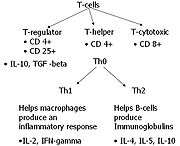
Prednisone
Prednisone is a synthetic corticosteroid drug that is particularly effective as an immunosuppressant drug. It is used to treat certain inflammatory diseases and some types of cancer, but has significant adverse effects...
, azathioprine
Azathioprine
Azathioprine is a purine analogue immunosuppressive drug. It is used to prevent organ rejection following organ transplantation and to treat a vast array of autoimmune diseases, including rheumatoid arthritis, pemphigus, inflammatory bowel disease , multiple sclerosis, autoimmune hepatitis, atopic...
, and other immunosuppressants—were primarily used in treatment. Patients with Crohn's disease that developed complications, including fistula
Fistula
In medicine, a fistula is an abnormal connection or passageway between two epithelium-lined organs or vessels that normally do not connect. It is generally a disease condition, but a fistula may be surgically created for therapeutic reasons.-Locations:Fistulas can develop in various parts of the...
e (= abnormal connections to the bowel) were treated with surgery. Patients with ulcerative colitis who do not respond to medications are still treated with colectomy
Colectomy
Colectomy consists of the surgical resection of any extent of the large intestine .-History:Sir William Arbuthnot-Lane was one of the early proponents of the usefulness of total colectomies, although his overuse of the procedure called the wisdom of the surgery into question.-Indications:Some of...
(= removal of the colon
Colon (anatomy)
The colon is the last part of the digestive system in most vertebrates; it extracts water and salt from solid wastes before they are eliminated from the body, and is the site in which flora-aided fermentation of unabsorbed material occurs. Unlike the small intestine, the colon does not play a...
).
However, basic science research showed that there were many cytokine
Cytokine
Cytokines are small cell-signaling protein molecules that are secreted by the glial cells of the nervous system and by numerous cells of the immune system and are a category of signaling molecules used extensively in intercellular communication...
s that were elevated in both Crohn's disease and ulcerative colitis. Crohn's disease cytokines, are of the type 1 (Th1) cytokines which include TNF-α, interleukin
Interleukin
Interleukins are a group of cytokines that were first seen to be expressed by white blood cells . The term interleukin derives from "as a means of communication", and "deriving from the fact that many of these proteins are produced by leukocytes and act on leukocytes"...
-2, and interferon
Interferon
Interferons are proteins made and released by host cells in response to the presence of pathogens—such as viruses, bacteria, or parasites—or tumor cells. They allow communication between cells to trigger the protective defenses of the immune system that eradicate pathogens or tumors.IFNs belong to...
γ. Ulcerative colitis was less conclusively linked to the production of Th2 cytokines.
Infliximab
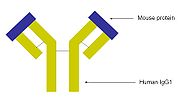
The monoclonal antibody infliximab
Infliximab
Infliximab is a monoclonal antibody against tumour necrosis factor alpha . It is used to treat autoimmune diseases. Remicade is marketed by Janssen Biotech, Inc...
is a mouse-human chimeric antibody to TNF-α. It first was used in the treatment of rheumatoid arthritis
Rheumatoid arthritis
Rheumatoid arthritis is a chronic, systemic inflammatory disorder that may affect many tissues and organs, but principally attacks synovial joints. The process produces an inflammatory response of the synovium secondary to hyperplasia of synovial cells, excess synovial fluid, and the development...
, and was the first biological agent used in the treatment of IBD. It is also used in the treatment of psoriasis
Psoriasis
Psoriasis is an autoimmune disease that appears on the skin. It occurs when the immune system mistakes the skin cells as a pathogen, and sends out faulty signals that speed up the growth cycle of skin cells. Psoriasis is not contagious. However, psoriasis has been linked to an increased risk of...
and ankylosing spondylitis
Ankylosing spondylitis
Ankylosing spondylitis , previously known as Bekhterev's disease, Bekhterev syndrome, and Marie-Strümpell disease is a chronic inflammatory disease of the axial skeleton with variable involvement of peripheral joints and nonarticular structures...
. Infliximab has shown significant success in treating Crohn's disease.
Other monoclonal antibodies
Other biological therapy agents and monoclonal antibodies have not showed as much efficacy in the treatment of IBD. These include etanerceptEtanercept
Etanercept is a drug that treats autoimmune diseases by interfering with the tumor necrosis factor by acting as a TNF inhibitor. Pfizer describes in a SEC filing that the drug is used to treat rheumatoid, juvenile rheumatoid and psoriatic arthritis, plaque psoriasis and ankylosing spondylitis...
(which is the soluble receptor for TNF
Tumor necrosis factors
Tumor necrosis factors refers to a group of cytokines family that can cause cell death . The first two members of the family to be identified were:...
. Adalimumab
Adalimumab
Adalimumab is the third TNF inhibitor, after infliximab and etanercept, to be approved in the United States. Like infliximab and etanercept, adalimumab binds to TNFα, preventing it from activating TNF receptors; adalimumab was constructed from a fully human monoclonal antibody, while infliximab...
(which is a humanized recombinant
Recombinant DNA
Recombinant DNA molecules are DNA sequences that result from the use of laboratory methods to bring together genetic material from multiple sources, creating sequences that would not otherwise be found in biological organisms...
antibody to TNF) showed effectiveness in patients with moderate-to-severe Crohn's disease, but less than that of infliximab. It however conveys an advantage in that it is given by subcutaneous injection
Injection (medicine)
An injection is an infusion method of putting fluid into the body, usually with a hollow needle and a syringe which is pierced through the skin to a sufficient depth for the material to be forced into the body...
as opposed to infliximab, which is given by intravenous infusion.
In 2005, two other recombinant medications were reported to have benefit in moderate to severe Crohn's disease. Certolizumab
Certolizumab pegol
Certolizumab pegol is a therapeutic monoclonal antibody produced by UCB for the treatment of Crohn's disease and rheumatoid arthritis.-Method of action:...
is a Fab
Antibody
An antibody, also known as an immunoglobulin, is a large Y-shaped protein used by the immune system to identify and neutralize foreign objects such as bacteria and viruses. The antibody recognizes a unique part of the foreign target, termed an antigen...
fragment of a humanized anti-TNF alpha monoclonal antibody that is attached to polyethylene glycol
Polyethylene glycol
Polyethylene glycol is a polyether compound with many applications from industrial manufacturing to medicine. It has also been known as polyethylene oxide or polyoxyethylene , depending on its molecular weight, and under the tradename Carbowax.-Available forms:PEG, PEO, or POE refers to an...
to increase its half-life
Half-life
Half-life, abbreviated t½, is the period of time it takes for the amount of a substance undergoing decay to decrease by half. The name was originally used to describe a characteristic of unstable atoms , but it may apply to any quantity which follows a set-rate decay.The original term, dating to...
in circulation. It was found to have efficacy over placebo medications for 10 weeks in the treatment of moderate to severe Crohn's disease in one large trial. Natalizumab
Natalizumab
Natalizumab is a humanized monoclonal antibody against the cellular adhesion molecule α4-integrin. Natalizumab is used in the treatment of multiple sclerosis and Crohn's disease. It is co-marketed by Biogen Idec and Élan as Tysabri, and was previously named Antegren. Natalizumab is administered by...
is an anti-integrin
Integrin
Integrins are receptors that mediate attachment between a cell and the tissues surrounding it, which may be other cells or the ECM. They also play a role in cell signaling and thereby regulate cellular shape, motility, and the cell cycle....
monoclonal antibody that shown utility as induction and maintenance treatment for moderate to severe Crohn's disease. However, it has been associated with progressive multifocal leukoencephalopathy
Progressive multifocal leukoencephalopathy
Progressive multifocal leukoencephalopathy , also known as progressive multifocal leukoencephalitis, is a rare and usually fatal viral disease that is characterized by progressive damage or inflammation of the white matter of the brain at multiple locations .It occurs almost exclusively in...
, a usually fatal viral infection of the brain
Brain
The brain is the center of the nervous system in all vertebrate and most invertebrate animals—only a few primitive invertebrates such as sponges, jellyfish, sea squirts and starfishes do not have one. It is located in the head, usually close to primary sensory apparatus such as vision, hearing,...
, that may limit its use.
Side effects and concerns
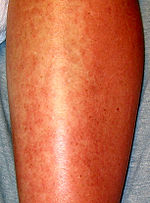
Adverse effect
In medicine, an adverse effect is a harmful and undesired effect resulting from a medication or other intervention such as surgery.An adverse effect may be termed a "side effect", when judged to be secondary to a main or therapeutic effect. If it results from an unsuitable or incorrect dosage or...
s of monoclonal antibodies, and specifically of infliximab, but these are rare. Early side effects include the risk of allergic
Allergy
An Allergy is a hypersensitivity disorder of the immune system. Allergic reactions occur when a person's immune system reacts to normally harmless substances in the environment. A substance that causes a reaction is called an allergen. These reactions are acquired, predictable, and rapid...
reactions (including anaphylaxis
Anaphylaxis
Anaphylaxis is defined as "a serious allergic reaction that is rapid in onset and may cause death". It typically results in a number of symptoms including throat swelling, an itchy rash, and low blood pressure...
which may be life-threatening), and reactions to the infusion. These are often treated with medications given before treatment. Infliximab also carries a risk of worsening infection, and can cause reactivation of old infections, like tuberculosis
Tuberculosis
Tuberculosis, MTB, or TB is a common, and in many cases lethal, infectious disease caused by various strains of mycobacteria, usually Mycobacterium tuberculosis. Tuberculosis usually attacks the lungs but can also affect other parts of the body...
. Over time, there is the risk of serum sickness
Serum sickness
Serum sickness in humans is a reaction to proteins in antiserum derived from an non-human animal source. It is a type of hypersensitivity, specifically immune complex hypersensitivity . The term serum sickness–like reaction is occasionally used to refer to similar illnesses that arise from the...
, which is a delayed hypersensitivity
Hypersensitivity
Hypersensitivity refers to undesirable reactions produced by the normal immune system, including allergies and autoimmunity. These reactions may be damaging, uncomfortable, or occasionally fatal. Hypersensitivity reactions require a pre-sensitized state of the host. The four-group classification...
response to the medication. Later complications may include multiple sclerosis
Multiple sclerosis
Multiple sclerosis is an inflammatory disease in which the fatty myelin sheaths around the axons of the brain and spinal cord are damaged, leading to demyelination and scarring as well as a broad spectrum of signs and symptoms...
and lymphoma
Lymphoma
Lymphoma is a cancer in the lymphatic cells of the immune system. Typically, lymphomas present as a solid tumor of lymphoid cells. Treatment might involve chemotherapy and in some cases radiotherapy and/or bone marrow transplantation, and can be curable depending on the histology, type, and stage...
. Finally, the medication is quite expensive, with treatment costs ranging from US$3000 to $8000 per infusion.
Loss of response to infliximab over time is a concern, due to the development of antibodies to infliximab (termed human anti-chimeric antibodies, or HACA). This can be reduced by concurrent treatment with other immunosuppressant medications (including azathioprine
Azathioprine
Azathioprine is a purine analogue immunosuppressive drug. It is used to prevent organ rejection following organ transplantation and to treat a vast array of autoimmune diseases, including rheumatoid arthritis, pemphigus, inflammatory bowel disease , multiple sclerosis, autoimmune hepatitis, atopic...
and methotrexate
Methotrexate
Methotrexate , abbreviated MTX and formerly known as amethopterin, is an antimetabolite and antifolate drug. It is used in treatment of cancer, autoimmune diseases, ectopic pregnancy, and for the induction of medical abortions. It acts by inhibiting the metabolism of folic acid. Methotrexate...
), by maintaining a regular infusion schedule, and by giving patients a pre-treatment dose of steroid medication.
Helminthic Therapy
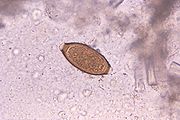
Helminthic therapy
Helminthic therapy, a type of immunotherapy, is the treatment of autoimmune diseases and immune disorders by means of deliberate infestation with a helminth or with the ova of a helminth. Helminths are parasitic worms such as hookworms and whipworms....
is the treatment of autoimmune diseases and immunological disorders by means of deliberate infection with a helminth worm or with the ova (eggs) of a helminth. Helminths are parasitic worms, or nematodes, such as Trichuris suis
Trichuris suis
Trichuris suis is a whipworm; the variations in thickness of the anterior and posterior segments give the parasite the characteristic “whip-like” appearance. Adult females measure 6 to 8 cm and adult males 3 to 4 cm. T. suis eggs are oval and yellow-brown with bipolar plugs.T...
or hookworms. Helminthic therapy is currently being studied as a promising treatment for several (non-viral) auto-immune diseases including Crohn's disease
Crohn's disease
Crohn's disease, also known as regional enteritis, is a type of inflammatory bowel disease that may affect any part of the gastrointestinal tract from mouth to anus, causing a wide variety of symptoms...
, and Ulcerative colitis
Ulcerative colitis
Ulcerative colitis is a form of inflammatory bowel disease . Ulcerative colitis is a form of colitis, a disease of the colon , that includes characteristic ulcers, or open sores. The main symptom of active disease is usually constant diarrhea mixed with blood, of gradual onset...
.
In helminth therapy (or worm therapy), a doctor inoculates a patient with a nematode
Nematode
The nematodes or roundworms are the most diverse phylum of pseudocoelomates, and one of the most diverse of all animals. Nematode species are very difficult to distinguish; over 28,000 have been described, of which over 16,000 are parasitic. It has been estimated that the total number of nematode...
worm that infects the intestinal tract. There are currently two closely related treatments available, inoculation with Necator americanus, or hookworm
Hookworm
The hookworm is a parasitic nematode that lives in the small intestine of its host, which may be a mammal such as a dog, cat, or human. Two species of hookworms commonly infect humans, Ancylostoma duodenale and Necator americanus. A. duodenale predominates in the Middle East, North Africa, India...
s, or with Trichuris suis ova, (TSO), the eggs of the pig whipworm
Whipworm
The human tapworm is a roundworm, which causes trichuriasis when it infects a human large intestine. The name whipworm refers to the shape of the worm; they look like whips with wider "handles" at the posterior end.-Life cycle:The female T. trichiura produces 2,000–10,000 single celled eggs per day...
.
Helminthic therapy emerged from the observation that people in less developed countries have more parasites and fewer autoimmune disorders and allergies. By comparison, highly industrialized countries with clean water and extensive sewage treatment systems (for example) have experienced a significant and sustained increase in autoimmune disorders. Current research and available therapy is targeted at, or available for, the treatment of Crohn’s Disease, Ulcerative Colitis, Inflammatory Bowel Disease (IBD) as well as Multiple Sclerosis, Asthma, Eczema, Dermatitis, Hay fever and food allergies. See Helminthic therapy
Helminthic therapy
Helminthic therapy, a type of immunotherapy, is the treatment of autoimmune diseases and immune disorders by means of deliberate infestation with a helminth or with the ova of a helminth. Helminths are parasitic worms such as hookworms and whipworms....
for information regarding those conditions.

